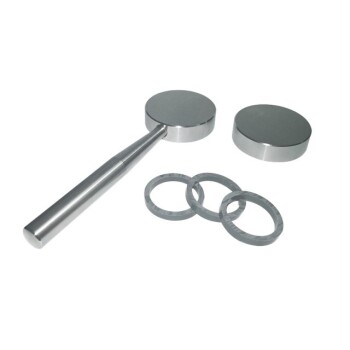In essence, a KBr pellet press is a highly effective, low-cost, and simple tool for preparing solid samples for FTIR spectroscopy. Its primary drawbacks are its manual nature, which limits throughput, and its specialization, which restricts its use almost exclusively to this single analytical technique.
The KBr pellet press represents a classic laboratory trade-off. It offers exceptional quality and reproducibility for its specific purpose—FTIR sample preparation—at a very low cost, but sacrifices the speed, automation, and application versatility found in more complex and expensive equipment.

The Core Advantage: High-Quality, Low-Cost FTIR Analysis
A KBr pellet press is designed with one primary goal: to create a sample matrix that is transparent to infrared light, allowing for clear analysis of the compound suspended within it.
Why KBr is the Standard
Potassium Bromide (KBr) is the material of choice because it is transparent to IR radiation across a wide spectral range. This ensures that the resulting spectrum is purely from your sample, not the binding material.
The press works by applying significant force to a mixture of finely ground KBr and your sample, fusing it into a solid, glass-like disc or pellet.
Precise Pressure for Reproducible Results
Modern presses, particularly hydraulic models, allow for the precise and controlled application of pressure. An integrated gauge provides real-time feedback.
This control is critical for producing uniform, high-quality pellets. It ensures that results are consistent and reproducible from one sample to the next, which is fundamental for reliable scientific data.
Simplicity and Ease of Use
Most KBr presses are designed for straightforward, manual operation. This user-friendly design means they can be operated with minimal training, making them accessible in both academic and industrial labs.
Hand presses, in particular, create excellent pellets with minimal effort and require virtually no dedicated lab space.
Understanding the Key Limitations
While excellent for its intended purpose, the KBr press is not a universally applicable tool. Its limitations are important to consider before making a purchase.
A Highly Specialized Tool
The primary and most significant limitation is its narrow application. The press is designed almost exclusively for preparing pellets for FTIR transmission spectroscopy.
If your lab requires sample preparation for other techniques like X-Ray Fluorescence (XRF) or needs to create polymer films, you will likely need a different, more versatile type of press.
Manual Operation Restricts Throughput
The manual process of grinding the sample, loading the die, pressing the pellet, and cleaning the equipment is inherently time-consuming.
This makes the KBr press unsuitable for high-throughput environments or any workflow requiring automated batch processing. It is a tool for deliberate, low-volume analysis.
Making the Right Choice for Your Laboratory
Choosing a KBr press depends entirely on your specific analytical needs, sample volume, and budget.
- If your primary focus is routine, low-volume FTIR analysis of solid samples: The KBr pellet press is an ideal, reliable, and highly cost-effective solution.
- If your laboratory requires high-throughput screening or automated batch analysis: You should investigate alternative, automated sample preparation methods, as the manual press will become a bottleneck.
- If you need a single press for multiple applications (e.g., FTIR and XRF): A more robust and expensive general-purpose hydraulic press would be a more strategic investment than a dedicated KBr press.
Ultimately, the KBr press remains a foundational and indispensable tool for any lab focused on high-quality spectroscopic analysis of solids.
Summary Table:
| Pros | Cons |
|---|---|
| High-quality, reproducible FTIR samples | Manual operation limits throughput |
| Low cost and simple to use | Specialized for FTIR only |
| Precise pressure control for consistency | Not suitable for other techniques like XRF |
Upgrade your lab's FTIR analysis with KINTEK's reliable lab press machines! Specializing in automatic lab presses, isostatic presses, and heated lab presses, we deliver precise, efficient solutions tailored to your laboratory needs. Whether you're handling low-volume samples or seeking enhanced reproducibility, our equipment ensures superior performance and cost savings. Contact us today to discuss how we can support your research and boost productivity!
Visual Guide

Related Products
- Laboratory Hydraulic Press 2T Lab Pellet Press for KBR FTIR
- Automatic Laboratory Hydraulic Press Lab Pellet Press Machine
- Laboratory Hydraulic Press Lab Pellet Press Machine for Glove Box
- Manual Laboratory Hydraulic Press Lab Pellet Press
- Laboratory Hydraulic Press Lab Pellet Press Button Battery Press
People Also Ask
- What is the role of a hydraulic press in KBr pellet preparation for FTIR? Achieve High-Resolution Chemical Insights
- Why is sample uniformity critical when using a laboratory hydraulic press for humic acid KBr pellets? Achieve FTIR Accuracy
- What role does a high-pressure laboratory hydraulic press play in KBr pellet preparation? Optimize FTIR Accuracy
- Why must a laboratory hydraulic press be used for pelletizing samples for FTIR? Achieve Precision in Spectral Data
- How do hydraulic press machines ensure precision and consistency in pressure application? Achieve Reliable Force Control for Your Lab



















